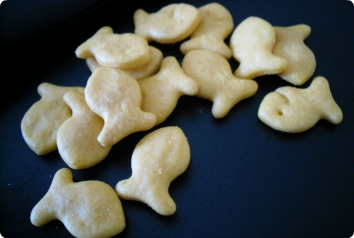 Like all new parents, I find myself in a daily dance to balance work and family life. Each morning I carefully step over the lego creations and chains of trains that sprinkle my office floor. More often than not, my son trails behind me, moving his blue plastic table adjacent to my wooden desk so both of us can “work.”
Like all new parents, I find myself in a daily dance to balance work and family life. Each morning I carefully step over the lego creations and chains of trains that sprinkle my office floor. More often than not, my son trails behind me, moving his blue plastic table adjacent to my wooden desk so both of us can “work.”
Each morning I look over my calendar then up at the colorful post-it notes decorating the frame of my computer screen. “Order Contacts,” “File Lesson Plans,” “Obtain SSN for Jack,” “Develop PPT for Residency,” “Buy more goldfish???” This last post-it catches my eye. Buy more goldfish???
For most parents, “buy goldfish” is a staple of every grocery store list. Feeding children quasi-healthy snacks between meals is par for the course. I hardly know any parent that goes out for the day without bags of goldfish, fruit snacks, mash-ups, pretzels, or cheerios in tow. But for our son, it was different.
During our first days together as a family in my son’s birth city of Taiyuan, chicken congee and dumplings were all Jack would eat. Then we moved on to Guangzhou, the headquarters of the US Consulate in China, and Jack’s diet expanded to include hard boiled eggs, bananas, and cheerios. He LOVED cheerios. We went through entire boxes of the cereal overnight. I remember asking the concierge where the nearest grocery store was, panicked to run low on the one food that so comforted our new son.
Every time we went for a walk Jack would carry his snack cup full of cheerios. Sitting in our hotel room, Jack would make sure to have his snack cup in sight. Many nights, cheerio filled snack cups slept with Jack in his bed. When it came time to check out of our hotel, my husband and I discovered hiding places of extra snack cups, under the bed, behind the curtains, and in a drawer for “just in case.”
As adoptive parents we knew this behavior was typical. Children who have been through times of not having their basic needs met often become self-reliant. In Maslow’s hierarchy these children feel they are at the base of the triangle, desperate to secure food for “later on.” It is pure survival mentality, and watching my young son experience this nearly broke my heart.
At home, snack cups went with us everywhere. From one room to another, in the car, in the yard. Even at dinner time, while Jack gobbled up his spaghetti, the snack cup remained firmly in sight. We expanded from cheerios to goldfish and banana chips. Then onto mashups and trail mix. Because Jack broke into our refrigerator at night, we made a shelf of preserved foods – cereal, applesauce, peanut butter crackers – he could access at any time. I remember one instance of traveling with Jack for two nights this past spring. The bellhop pulled out my suitcase, my stroller, and finally my 5×5 box of food. “You know there’s room service here, right?” I just shrugged.
Then one day, we hurried out the door and I forgot to bring Jack’s snack cup. I didn’t realize it at the time but when we returned home the green and blue snack cup glared accusingly at me from the counter. “I’m so sorry,” I said to Jack, and rushed to give him the snack cup. Jack looked at the snack cup then looked at me, “Play now?” Later I found the snack cup, carelessly tossed aside under the dining room table, still full of cheerios.
Today I buy cheerios, and goldfish, and Teddy grams, and mashups, but no more than any other family. Jack still loves his snack cup, but only when he’s hungry and usually only in the car during long trips. Today when I offer him his snack cup as we walk he says “No, mama carry” then runs along in front me. I guess he likes to keep both hands free to explore the world.
About the Author: Jennifer Jones is an adoptive mother, playwright, storyteller, and solo performer. She frequently blogs about her adoption experience at Letters to Jack, where this was originally published. You can also find her on Twitter.
Photo courtesy of Flickr, Lena LeRay.


